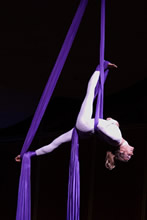Each season, Keith Lockhart returns to the Brevard Music Center as a favorite son to work among the students and conduct a concert. These are special times, certainly, due in no small measure to his celebrity as the conductor of the Boston Pops, but his own time during two summers at BMC is often recalled as formative and positive. He first returned to the Center in 1996 as a guest artist. In 1997, he was appointed chair of the National Board of Advisors. In 1998, he received the distinguished alumni award, and in 2000, he joined the BMC Board of Trustees. As the 2006 season kicked off back in late June, the Center announced that Lockhart would assume the position of Artistic Advisor on October 1, 2007, replacing David Effron, who retires next year. That’s all fine as far as it goes, but there is some slight of verb taking place here and we’ll have to come back to that subject in a minute.
For his July 16 program, Lockhart chose to open with Gabriela Lena Frank’s Three Latin-American Dances for Orchestra, written in 2003. As this interesting work unfolded I was struck by the unique organization of the sound and Lockhart’s apparent knack for finding it. Last year he brought a recently composed piece for the same opening position, blue cathedral (1999) by Jennifer Higdon. This has an interesting ending where the entire violin section changes to Chinese reflex balls that make bell-like sounds when shaken.
In Frank’s piece, we have the standard complement of strings, woodwinds, brass and percussion. “Jungle Jaunt,” the first movement, includes motives from Pan-Amazonian dance forms with a hint of Argentina and homage to Bernstein’s West Side Story. Then, in “Highland Harawi,” we heard Peruvian-Inca derived highland folktunes from the Andes and a nod to Béla Bartók. The third movement, “The Mestizo Waltz,” features echoes from the South American Pacific coast Indian culture. These Dances are wonderfully written, and the solid performance included interesting dynamic directions.
The rest of the concert featured some big guns. First, cellist Johannes Moser appeared for a performance of Piotr Tchaikovsky’s Variations on a Rococo Theme, Op. 33. This is one of those big shot cello/orchestra pieces that separate the men from the boys (or the women from the girls). The 1877 work for small orchestra is a theme with eight variations. It has brutal knuckle-busting demands, and it doesn’t leave much room for the soloist to rest. Moser, who was born in Munich and won the 2002 Tchaikovsky Competition (and a special prize for interpreting this piece), made it look like child’s play while producing a creamy, rich, lush, and seamless sound. Lockhart kept the orchestra on its toes, swelling to prominence at the appropriate places but otherwise staying out of the way. It was very professional!
After intermission, we heard the Symphony No. 5, in B-flat, Op. 100, of Sergei Prokofiev. In four movements with an attractive Allegro giocoso ending, this is one of those great masterworks you never understand completely. The provenance is interesting: it was premiered on January 13, 1945, in the great Hall of the Moscow Conservatory, the same day the Red Army declared victory in the war. Prokofiev described the work as a monument to the “greatness of the human spirit,” which is obvious throughout. Lockhart made it work using a score but no stick. He kneads the beat with his hands, and you must pay attention, either as listener or a player, to get every detail.
Afterward, in anticipation of his new post next year, audience members were invited to stay for a question and answer session with Lockhart, who spoke from the stage. From this session we learned that he probably will add some Boston Pops-type concerts at the Center. He hinted that the Boston Pops orchestra might even come and play! He also mentioned former Pops conductor and Grammy winning film score composer John Williams as possible guest conductor.
Which brings us to the slight of verb. The press announcement reads like Lockhart is going to replace Effron, but the problem is in the title: Effron is Artistic Director, and Lockhart will be Artistic Advisor. That says to me Lockhart won’t be around all summer or directing the programming in the same way Effron has. I spoke with BMC President & CEO John Candler about this point. He confirmed that they are still working out the details of who would be conducting the orchestras if Lockhart can’t be around, and Candler also confirmed that the new Artistic Advisor probably would not be on the grounds for the entire season. Obviously there are still things to resolve.
Oh, the other item to come from the Q&A session was what it costs to put on that fantastic 4th of July celebration up in Boston every year. Well, we didn’t hear the actual cost, but we learned that the sponsorship target for the marketing department is a million bucks.











